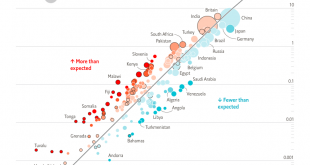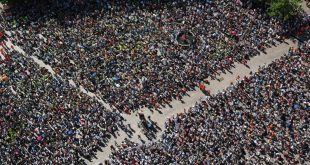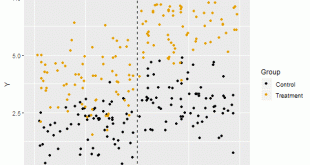I had a Facebook discussion yesterday about statistics. At one point, my interlocutor posted “You should know better than anyone that statistics can be manipulated to actually show the opposite of what is real.” Well, just to be clear, that’s not a problem with statistics, that’s a problem of motivated reasoning, which is not a statistical algorithm.The topic of our discussion was economics, and he says he trusts Krugman on economics. Krugman, of...
Read More »IPA’s weekly links
Guest post by Jeff Mosenkis of Innovations for Poverty Action First a plug – my colleagues at IPA have done amazing work this year quickly pivoting a big research organization to tackle the covid crisis head-on, studying hunger, refugee issues, education and 80+ other topics, and staying up late into the night, over and over again. Not all of our expenses are covered directly by research grants, so we rely on donations for the rest. If you donate here BEFORE TUESDAY you gift will be...
Read More »COVID-19: The Statistics of Social Distancing
By James Kwak It seems that social distancing is the primary strategy for slowing the propagation rate of COVID-19. That and widespread testing are the key tools for containing an outbreak, for reasons discussed repeatedly in the media. Photo by Hans Braxmeier from PixabayBut does it work? Or, more to the point, how well do different degrees of social distancing work? How strict does it need to be, and how tightly does it need to be enforced? It seems to me that this is an important and at...
Read More »COVID-19: The Statistics of Social Distancing
By James Kwak It seems that social distancing is the primary strategy for slowing the propagation rate of COVID-19. That and widespread testing are the key tools for containing an outbreak, for reasons discussed repeatedly in the media. Photo by Hans Braxmeier from PixabayBut does it work? Or, more to the point, how well do different degrees of social distancing work? How strict does it need to be, and how tightly does it need to be enforced? It seems to me that this is an important and at...
Read More »That study about the health risks of red meat: An excellent news report — Andrew Gelman
Most interesting for the analysis of the process relative to statistical reasoning and news reporting, which happens to be the bedrock of economics and the narratives based on conventional economics. Short and not wonkish.Statistical Modeling, Causal Inference, and Social ScienceThat study about the health risks of red meat: An excellent news reportAndrew Gelman | Professor of Statistics and Political Science and Director of the Applied Statistics Center, Columbia University
Read More »IPA’s weekly links
Guest post by Jeff Mosenkis of Innovations for Poverty Action The animation above comes from a cool page of causal inference animations by Nick Huntington-Klein (h/t Alex Tabarrok), which go through, step-by-step with scatterplots, how different methods work. Alex was one of many who offered helpful tips for getting through undergrad econometrics. Call for papers for the Y-Rise conference Dec 15-21 on the science of scaling promising interventions. They have research networks looking at...
Read More »It’s not just p=0.048 vs. p=0.052 — Andrew Gelman
Numbers may be eternal and unchanging, but they are not gods. Andrew Gelman observes that we also have to step back and use our common sense regarding what the numbers actually say, instead of drawing arbitrary lines based on self-imposed criteria like "significance" and then take them as "messages from the gods." It doesn't work like that. Formalism only goes so far. So. Yes, it seems goofy to draw a bright line between p = 0.048 and p = 0.052. But it’s also goofy to draw a bright line...
Read More »Lars P. Syll — On the applicability of statistics in social sciences
David Salsburg quote.Lars P. Syll’s BlogOn the applicability of statistics in social sciences Lars P. Syll | Professor, Malmo University
Read More »Gigerenzer: “The Bias Bias in Behavioral Economics,” including discussion of political implications — Andrew Gelman
Gerd Gigerenzer takes aim at Daniel Kahneman, Richard Thaler and Cass Sunstein for being uncritical and going too far. While not endorsing rational choice theory, he stresses that the truth lies between the extremes of rationality and irrationality and claims behavioral economics tends to over emphasize irrationality consequent on cognitive-effective bias. It's neither reason or all bias, either all or mostly, but a combination of rationality and irrationality.Statistical Modeling, Causal...
Read More »My Journey from Theory to Reality — Asad Zaman
Over the twenty years that I have been pursuing an Islamic approach — focusing on the production of USEFUL knowledge, I have managed to heal all three of these divides. This happens naturally, when you focus on solution of real world problems. You automatically need to combine information coming from many different specialization areas. You need to use reasoning and also intuition. You also need to use both theory and its applications to the real world experiences. This leads to substantial...
Read More » Heterodox
Heterodox




